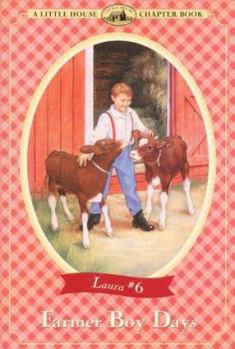Farmer Boy Days
(Book #6 in the Little House Chapter Books: Laura Series)
Select Format
Select Condition 
Book Overview
From shearing sheep and milking cows to training young calves, Almanzo Wilder worked very hard on his family's farm in New York. But when his chores were all done, Almanzo could go to his favorite place in the whole world -- the Horse-Barn. Although his father wouldn't let him handle the frisky colts, Almanzo could still look at them and dream of one day having a horse all his own!These gentle adaptions from Laura Ingalls Wilder's original "Little House" books capture the spirit of this beloved pioneer girl and invite beginning chapter-book readers into the magical world of Little House. This glimpse into America's frontier past brings Laura's cherished stories to a whole new generation of young readers.
Format:Paperback
Language:English
ISBN:0064420612
ISBN13:9780064420617
Release Date:January 1998
Publisher:HarperCollins
Length:80 Pages
Weight:0.18 lbs.
Dimensions:0.2" x 5.1" x 7.6"
Age Range:7 to 10 years
Grade Range:Grades 2 to 5
Customer Reviews
2 ratings
Educating the Boy to be a Man
Published by Thriftbooks.com User , 19 years ago
Farmer Boy, by Laura Ingalls Wilder Laura Ingalls Wilder (1867-1957) wrote her stories about living in the late 19th century. She married Almanzo Wilder (from Malone NY, near the Canadian border), another pioneer who came west as a young man. This book is about young Almanzo and his life as a farmer boy. They ate a hearty farm breakfast. Calories don't count when you walk everywhere, work all day long, and live in a house lacking central heating when it is forty below zero. Chapter 4 tells schooling in the good old days. Perhaps its explains why William Quantrill or George A. Custer were teachers before their military careers? Chapter 7 describes old-fashioned twisted doughnuts that turn over when cooked in oil. It tells how people lived without running water or electricity for dishwashing. Chapter 9 tells about breaking the calves. You could never teach an animal if you struck it, or shouted at it. You must always be gentle and quiet and patient. The animal must trust to be hard-working. Chapter 11 describes spring planting. Then there was sheep-shearing (Chapter 14). Almanzo's father explains that money is the result of hard work. You can spend and lose it, or you can buy a piglet, raise it, and get more money for it. Father explains that while guns won the Revolution, it was axes and plows that made America by farming the land (Chapter 16). Almanzo had mischievous ways (Chapter 18). Chapter 22 tells of the butchering, and how every part was used. Note how often these memories have to do with feasting on holidays (Chapter 26). Smells evoke memories. The book tells of a year in Almanzo's life as a farmer boy, through the cycle of seasons. Its descriptions of life long ago is educational and entertaining. The book presents thrift as the optimal virtue, and better than squandering or parsimony. The events show that human nature hasn't changed much. Almanzo's father gave him a good practical education to prepare him to for his future. Father and Mother discuss Almanzo's future. Would he become a wheelwright and townsman, dependent on trade, or be an independent farmer and raise his own and other's food? You know how he decides. Now it can be told. When Mother came home she saw the papered-over spot on the wall paper the very next day. She quickly figured out what happened, as Mothers usually do. But she decided not to make a fuss over it, as the children fixed their mistakes.
Farmer Boy from a new dimension
Published by Thriftbooks.com User , 24 years ago
This book is dazzling with stories about Almanzo Wilder and his childhood with brothers and sisters.Mellisa Peterson and Laura Ingalls Wilder really know how to attract young and imaginative minds to a great book.This book is filled with stories from the pioneer days in New York City.Come and enter the bustling world of young Almanzo Wilder, his farm in New York,and his family!






